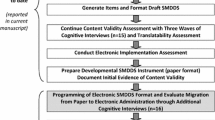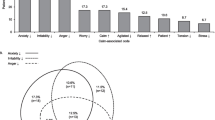Abstract
Background
Clinical outcome assessments may not fully capture patients’ perspectives of treatment benefit or tolerability. Incorporating individual exit interviews might enhance the description of the patient experience of drug effects.
Objective
The objective of this study was to evaluate the patient treatment experience in a clinical trial of treatment-resistant depression utilizing exit interview methodology.
Methods
Individual patient interviews were conducted with subjects exiting two phase II clinical trials involving investigational agents for treatment-resistant depression. Interviews included standardized questions about patients’ perceptions of health changes and interest in continued use of the investigational agent. Constant comparative analysis of blinded data was used to identify, code, and categorize the data followed by a subsequent analysis of unblinded data to evaluate any potential treatment differences.
Results
Ninety subjects completed exit interviews across the two trials. Most subjects (90%, Trial 2001; 74%, Trial 2002) reported at least one health change. Most subjects rated these changes to be at least moderately important, with most being rated “very important” to “extremely important.” After unblinding, participants receiving active therapy alone reported most of the positive health changes (80% of overall positive changes in Trial 2001, 89% in Trial 2002), whereas patients taking placebo alone reported the majority of negative health changes (57% in Trial 2002). Positive changes included not only anticipated changes in mood but also potential cognitive benefits such as mental alertness, improved sleep, and better concentration.
Conclusions
Standardized interview data provided direct patient insight into the treatment experience from the patient perspective. Data from these interviews assisted in phase III endpoint selection by providing data on relevant concepts in the target treatment-resistant depression population receiving a new treatment, thus enabling the selection of tools to capture noted treatment effects and, by eliminating irrelevant constructs or measures, thereby reducing data “noise.”
Trial Registration
ClinicalTrials.gov NCT01640080; NCT01627782.

Similar content being viewed by others
Data availability
All study data are stored with the study sponsor and will be maintained in accordance with company requirements. The datasets generated and/or analyzed during the current study are not publicly available because of privacy stipulations within the contractual agreement between RTI Health Solutions and the study sponsor.
References
US Food and Drug Administration. Roadmap to patient-focused outcome measurement in clinical trials. 2013. Available from: http://www.fda.gov/Drugs/DevelopmentApprovalProcess/DrugDevelopmentToolsQualificationProgram/ucm284077.htm. Accessed 9 Mar 2018.
US Food and Drug Administration. Guidance for industry. Patient-reported outcome measures: use in medical product development to support labeling claims. 2009. http://www.fda.gov/downloads/Drugs/GuidanceComplianceRegulatoryInformation/Guidances/UCM193282.pdf. Accessed 9 Mar 2018.
DiBenedetti DB, Brown TM, Romano C, Ervin C, Lewis S, Fehnel SE. Conducting patient interviews within a clinical trial setting. RTI Press Publication No. OP-0054-1808. Research Triangle Park (NC): RTI Press; 2018. Available from: https://doi.org/10.3768/rtipress.2018.op.0054.1808. Accessed 9 Jun 2019.
Nunn A, Anywaine Z, Seeley J, Munderi P, Levin J, Kasirye R, et al. Exit interviews administered to patients participating in the COSTOP placebo controlled randomised trial in Uganda. Contemp Clin Trials Commun. 2016;3:142–6.
Simmonds B, Turner N, Thomas L, Campbell J, Lewis G, et al. Patients’ experiences of participating in a large-scale trial of cognitive behavioural therapy for depression: a mixed methods study. Fam Pract. 2013;30(6):705–11.
Snyder CF, Herman JM, White SM, Luber BS, Blackford AL, Carducci MA, et al. When using patient-reported outcomes in clinical practice, the measure matters: a randomized controlled trial. J Oncol Pract. 2014;10(5):e299–306.
Singh JB, Fedgchin M, Daly E, Xi L, Melman C, De Bruecker G, et al. Esketamine in adult treatment-resistant depression: a double-blind, double-randomization, placebo-controlled study. Biol Psychiatry. 2016;80:424–31.
Singh JB, Fedgchin M, Daly EJ, De Boer P, Cooper K, Pilar L, et al. A double-blind, randomized, placebo-controlled, dose-frequency study of intravenous ketamine in patients with treatment-resistant depression. Am J Psychiatry. 2016;173(8):816–26.
Montgomery SA, Asberg M. A new depression scale designed to be sensitive to change. Br J Psychiatry. 1979;134:382–9.
Boeije H. A purposeful approach to the constant comparative method in the analysis of qualitative interviews. Qual Quant. 2002;36:391–409.
Gnanasakthy A, DeMuro CJ, Clark MJ, Mordin MM, Thomas S. Role of patient-reported outcome measures in the assessment of central nervous system agents. Ther Innov Regul Sci. 2013;47(5):613–8.
Ishak WW, Mirocha J, Pi S, et al. Patient-reported outcomes before and after treatment of major depressive disorder. Dialogues Clin Neurosci. 2014;16(2):171–83.
Acknowledgements
The authors acknowledge the esketamine clinical trial patients for their participation in this research. The authors also acknowledge the site principal investigators: F. Godenir, P. Gross, D. Krefetz, B. Kurian, J. Landowski, E. Litman, R. Malcolm, I. Melamed, C. Normann, R. Riesenberg, R. Robison, G. Sanacora, S. Wilkinson, A. Tadic, A. Winokur, G. Zammit, and the site staff who participated in this study. The authors are grateful to Kate Lothman, Karyn Hede, and John Forbes for their technical assistance.
Author information
Authors and Affiliations
Contributions
SL collaborated with CDM on the analysis and reporting of the exit interview data, drafted the initial manuscript, incorporated feedback from co-authors, and has approved the final version of the manuscript. CDM collaborated with SL on the analysis and reporting of the exit interview data, reviewed and contributed to the manuscript, and has approved the final version of the manuscript. GB participated as a clinical investigator, reviewed and contributed to the manuscript, and has approved the final version of the manuscript. JWM participated as a clinical investigator, reviewed and contributed to the manuscript, and has approved the final version of the manuscript. RS participated as a clinical investigator, reviewed and contributed to the manuscript, and has approved the final version of the manuscript. JBS collaborated with RTI Health Solutions on the analysis and reporting of the exit interview data, reviewed and contributed to the manuscript, and has approved the submitted version of the manuscript. CJ collaborated with RTI Health Solutions on the analysis and reporting of the exit interview data, reviewed and contributed to the development of the manuscript, and has approved the submitted version of the manuscript.
Corresponding author
Ethics declarations
Funding
The study was conducted by RTI Health Solutions, which received consultancy fees from Janssen Pharmaceuticals. RTI Health Solutions and Janssen Pharmaceuticals were involved in the analysis and interpretation of data and the decision to submit these data for publication. Funding for the preparation of this article was provided by Janssen Pharmaceuticals. RTI Health Solutions is a research unit of RTI International, a not-for-profit research institute.
Conflict of interest
Sandy Lewis and Carla (DeMuro) Romano are employees of RTI Health Solutions. Geert De Bruecker is an independent healthcare practitioner specializing in the field of psychiatry and has no conflicts of interest that are directly relevant to the content of this article. Jaskaran B. Singh and Carol Jamieson are employees of Janssen Pharmaceuticals. James W. Murrough is an employee of the Icahn School of Medicine at Mount Sinai. In the past 3 years, he has provided consultation services to Allergan, Fortress Biotech, Novartis, Janssen Research and Development, Genentech, ProPhase, and Global Medical Education and has received research support from Avanir Pharmaceuticals. He is named on a patent pending for neuropeptide Y as a treatment for mood and anxiety disorders. The Icahn School of Medicine at Mount Sinai (to which James W. Murrough is affiliated) is named on a patent and has entered into a licensing agreement and will receive payments related to the use of ketamine if it is approved for the treatment of depression. James W. Murrough is not named on the patent and will not receive any payments. Richard Shelton is an employee of the University of Alabama at Birmingham School of Medicine. In the past 3 years, he has provided consultation to Acadia Pharmaceuticals, Allergan Inc., Cerecor, Inc., Clintara, LLC, Janssen Pharmaceutica, Lundbeck A/S, Medtronic, Inc., MSI Methylation Sciences, Inc., Naurex, Inc., Nestle’ Health, Pfizer, Inc., and Takeda Pharmaceuticals. He has received grant support from Acadia Pharmaceuticals, Alkermes, Inc., Allergan Inc., Assurex Health, Avanir Pharmaceuticals, Cerecor, Inc., Genomind, Intracellular Therapies, Janssen Pharmaceutica, Nestle’ Health, Otsuka Pharmaceuticals, and Takeda Pharmaceuticals.
Ethical approval
This project was reviewed and approved by an institutional review board, and all procedures were in accordance with the ethical standards of the 1964 Helsinki Declaration and its later amendments.
Informed consent
Written informed consent was obtained from all participants prior to study participation.
Electronic supplementary material
Below is the link to the electronic supplementary material.
Rights and permissions
About this article
Cite this article
Lewis, S., Romano, C., De Bruecker, G. et al. Analysis of Clinical Trial Exit Interview Data in Patients with Treatment-Resistant Depression. Patient 12, 527–537 (2019). https://doi.org/10.1007/s40271-019-00369-8
Published:
Issue Date:
DOI: https://doi.org/10.1007/s40271-019-00369-8




